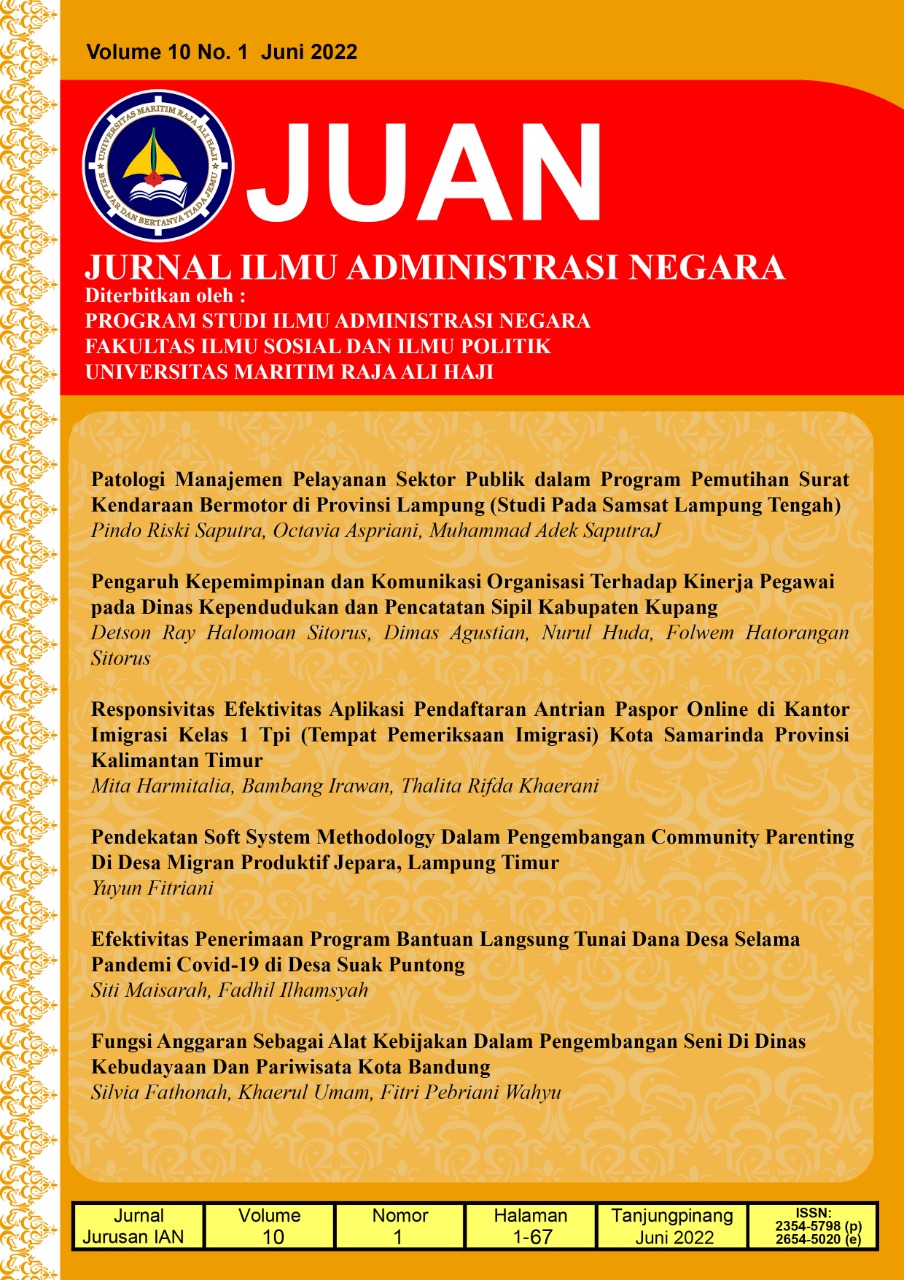FUNGSI ANGGARAN SEBAGAI ALAT KEBIJAKAN DALAM PENGEMBANGAN SENI DI DINAS KEBUDAYAAN DAN PARIWISATA KOTA BANDUNG
DOI:
https://doi.org/10.31629/juan.v10i1.4444Keywords:
Budget Functions, Program Policies, Government/ServicesAbstract
This research was conducted at the Department of Culture and Tourism of the city of Bandung. By using a qualitative approach and descriptive research methods. The Department of Culture and Tourism of the city of Bandung as the government agency responsible for policies regarding the art development program has a main program carried out, namely a coaching program for art institutions. This program policy is a routine and priority program policy for the Bandung City Culture and Tourism Office. The budget owned by the department of 25% is allocated to programs related to arts, this makes a large enough budget to function well or not in the implementation of program policies. The results of the study indicate that the existing budget function for this art development program policy can be said to be ineffective, in which the problems that occur are still the same when the budget has not been reduced and after there has been a budget reduction. This needs to be evaluated and reviewed by the service so that the objectives of the arts development program policy can be achieved and a large enough budget can function to direct program policies with good results.
Downloads
References
Abdullah Ikhsan, & Afrida Sari Riza. (2017). Analisis Fungsi Anggaran Sebagai Alat Pengawasan Penerimaan Pajak Bumi Dan Bangunan Pada Kecamatan Medan Denai . Fakultas Ekonomi Dan Bisnis Universitas Muhammadiyah Sumatera Utara .
Alim, M. N. (2018). Efektivitas Perpaduan Komponen Anggaran dalam Prosedur Anggaran: Pengujian Kontinjensi Matching. Jurnal Akuntansi Dan Keuangan , 10.
Ani, L., Mulyadi, J., & Pratowo, D. (2020). Analisis Faktor-Faktor Yang Mempengaruhi Penyerapan Anggaran Belanja Dengan Perencanaan Anggaran Sebagai Pemodarasi Pada Pemerintah Kota Depok Tahun 2013-2017. JURNAL EKOBISMAN , Vol.5.
Creswell. John W. (2013). Research Design (Pendekatan Metode Kualitatif, Kuantitatif dan Campuran). Pustaka Pelajar.
Dayani, D. (2019). Implementasi Kebijakan Anggaran Berbasis Kinerja Pada Dinas Kebakaran dan Penanggulangan Bencana Kota Bandung Tahun 2016. http;//digilib.uinsgd.ac.id/25592/
Glen, A. W. (2010). Budgeting Penyusunan Anggaran Perusahaan: perencanaan dan pengendalian. (Edisi 4). R.A Fadlytdan BEC .
Herzon, Y., & Kumorotomo, W. (2011). Politik Anggaran:Studi Tentang Proses Perumusan Kebijakan Anggaran Belanja Langsung SKPD Dalam Penyusunan APBD Tahun 2011 Di Kabupaten Kerinci Provinsi Jambi. Universitas Gadah Mada.
Indrawan, R. (2019). Metodologi Penelitian. Refika Aditama.
Islamy M.I. (2006). Kebijakan Publik (Edisi Kedua). Universitas Terbuka.
Mardiasmo. (2009). Akutansi Sektor Publik. Andi.
Mardiasmo. (2017). Efisiensi dan Efektivitas. Andy.
Mulyadi, D. (2008). Studi Kebijakan Publik dan Pelayanan Publik. Alfabeta.
Ramantha, I. W. (2017). “Pengaruh Partisipasi Anggaran, Job Relevant Information Terhadap Kinerja Manajerial. Jurnal Akuntansi, Bisnis, Dan Manajemen.
Sari, M. P., & Afrizoni, H. (2020). Analisis Anggaran Operasional Sebagai Alat Ukur Kinerja Pada PT. BPR Ganto Nagari 1954 Lubuk Alung. Pareso Jurnal, Vol.2.
Silalahi, U. (2012). Metode Penelitian Sosial. PT. Refika Aditama.
Sugiyono. (2015). Metode Penelitian dan Pengembangan Pendekatan Kualitatif, Kuantitatif dan R&D. Alfabeta.
Sugiyono. (2018). Metode Penelitian Kuantitatif, Kualitatif Dan R&D. Alfabeta.
Widoyoko, E. P. (2014). Teknik Penyusunan Instrumen Penelitian. Pustaka Pelajar.
Wiguna, K. (2016). Pengaruh Anggaran Terhadap Efektivitas Kerja Pegawai Di Kecamatan Cangkuang Kabupaten Bandung . Universitas Pasundan.
Wixon, R. (1953). Budgetary Control. Alexander Hamilton Institute.
Downloads
Published
Issue
Section
License
You are free to:
- Share — copy and redistribute the material in any medium or format for any purpose, even commercially.
- Adapt — remix, transform, and build upon the material for any purpose, even commercially.
- The licensor cannot revoke these freedoms as long as you follow the license terms.
Under the following terms:
- Attribution — You must give appropriate credit, provide a link to the license, and indicate if changes were made . You may do so in any reasonable manner, but not in any way that suggests the licensor endorses you or your use.
- ShareAlike — If you remix, transform, or build upon the material, you must distribute your contributions under the same license as the original.
- No additional restrictions — You may not apply legal terms or technological measures that legally restrict others from doing anything the license permits.














